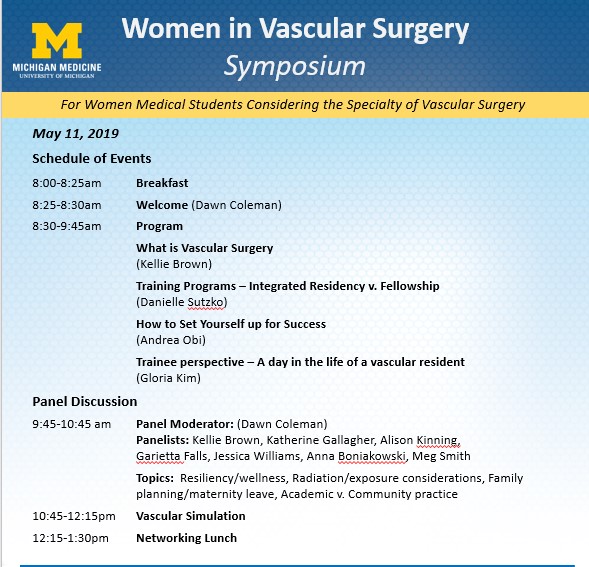A Proposed Vascular Surgery Pilot Program For Regional Recruitment
Anna Boniakowski, MD1, Gloria Kim, MD1, Margaret Smith, MD1, Heather Golden1, Danielle C. Sutzko, MD, MS1, Andrea Obi, MD1, Kellie Brown, MD1, Benjamin J. Pearce, MD2, Malachi Sheahan, III, MD3, Dawn M. Coleman, M.D.1.
1University of Michigan, Ann Arbor, MI, USA, 2University of Alabama, Birmingham, AL, USA, 3LSU Health, New Orleans, LA, USA.
Objectives: With the vascular surgery (VS) workforce facing projected shortages, there is an urgent need to enhance recruitment and training. Minimal interactions between surgeons and students results in negative impressions of surgery by students and can be countered with effective mentoring and ‘early intervention’. Additionally, women still make up a minority of the VS workforce. Our intention was to host a pilot program for regional recruitment to enhance specialty outreach and better understand recruitment barriers. Methods: A one-day pilot program was hosted at the University of Michigan, targeting geographically local female medical students across Michigan and Northwest Ohio. The program featured 13 women faculty and trainees from diverse academic and community local VS programs. A concise didactic program (Figure) was followed by a panel discussion intended to improve preconceived perceptions of female medical students regarding women’s roles in VS, a ‘hands-on’ introduction of open and endovascular simulation, and a professional networking lunch. Students were surveyed by email following the program. Program cost totaled $4,030. Results: Fifty-two students registered for the symposium from 14 undergraduate and medical schools (including 6 out-of-state). Twenty-four students attended the program and survey response rate was 75%. 66.5% expressed an interest in VS before participating in the program, while 94% responded that the program had a ‘(very) positive’ impact on their intention to pursue VS. 61% of responded that they did not have a VS mentor (local or remote) and only 50% believed there were local opportunities to rotate on VS. 83% of students expressed they were looking for remote mentoring. Perceived barriers to VS, based on student perception, included: lifestyle during/after training (39%), work force diversity within the specialty (39%), competitiveness (28%) and physical demands (22%). Conclusions: Enhanced exposure of medical students to the specialty of VS is urgently needed. This pilot program serves as a model for the regional recruitment of diverse students, and can easily be incorporated into additional geographic sites at centers of VS excellence or in-line with state VS society meetings. This expanded outreach to enhance the VS pipeline allows for longitudinal student exposure and the opportunity for remote mentoring. 
Back to 2021 Abstracts
